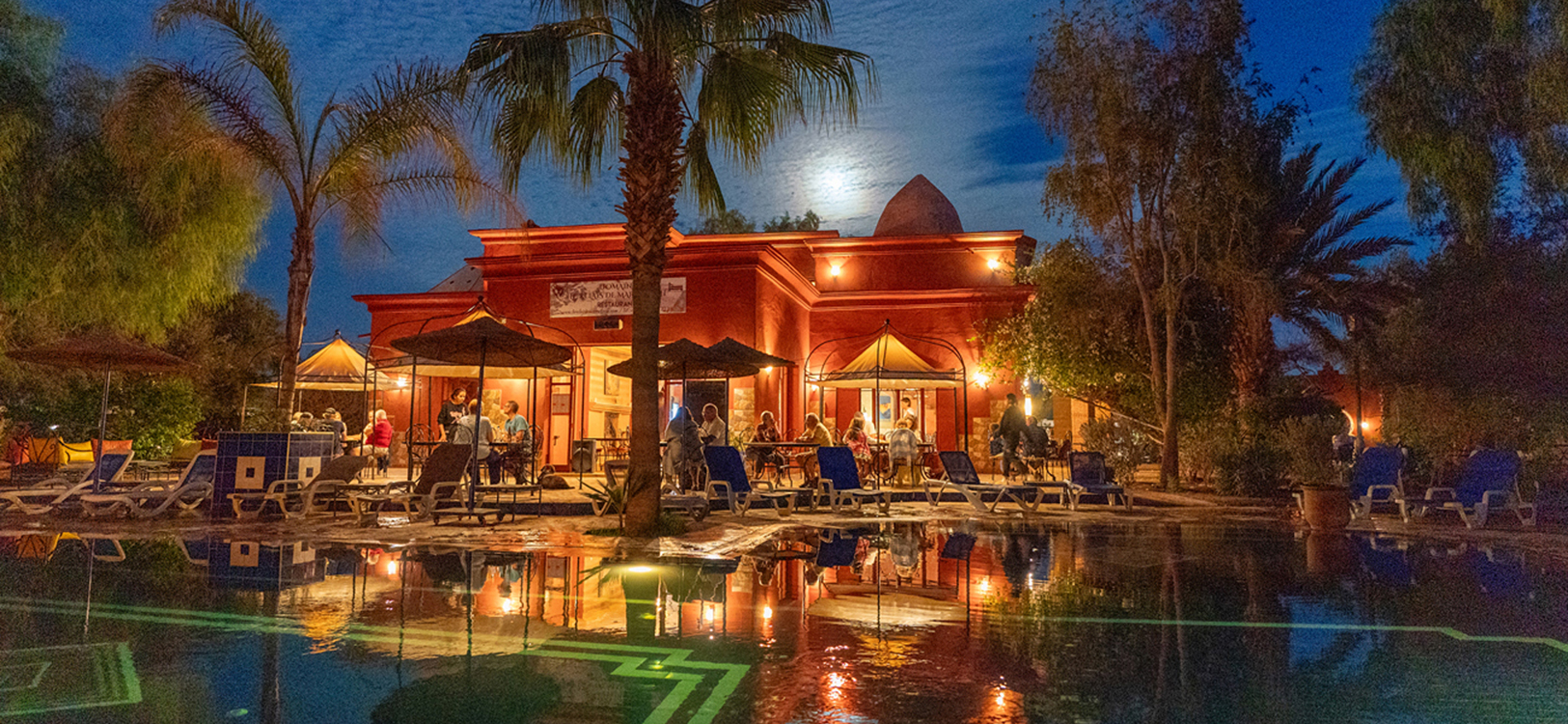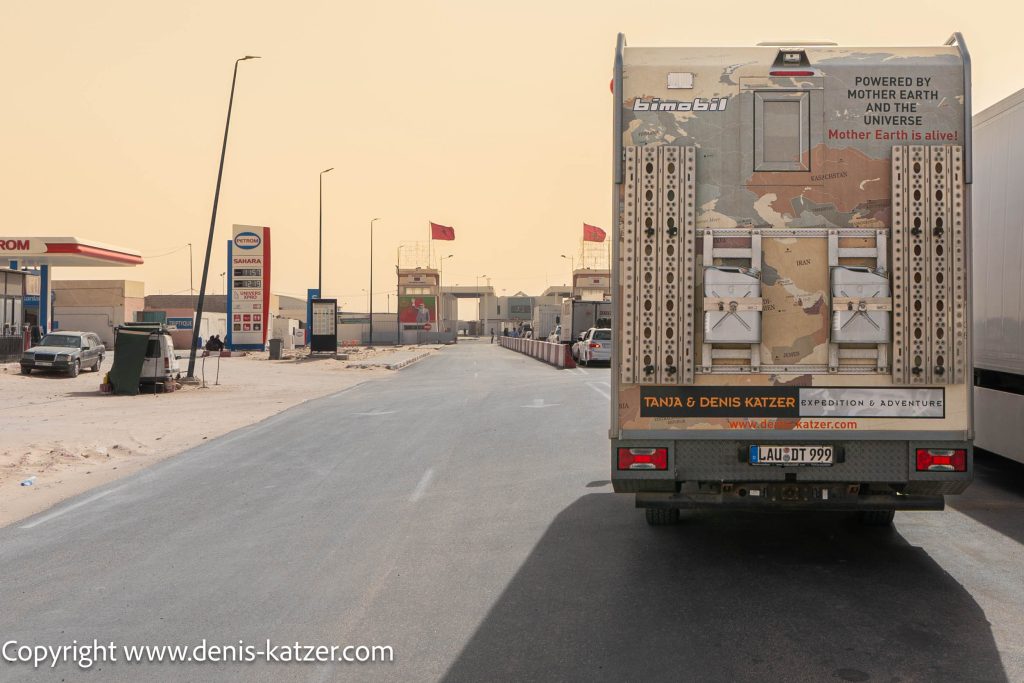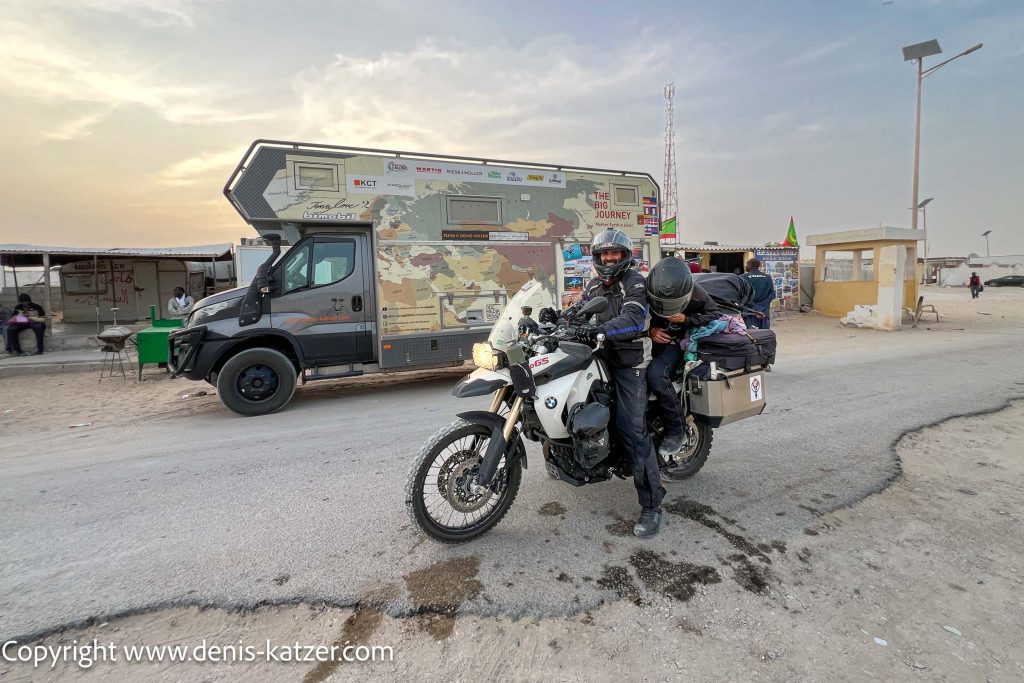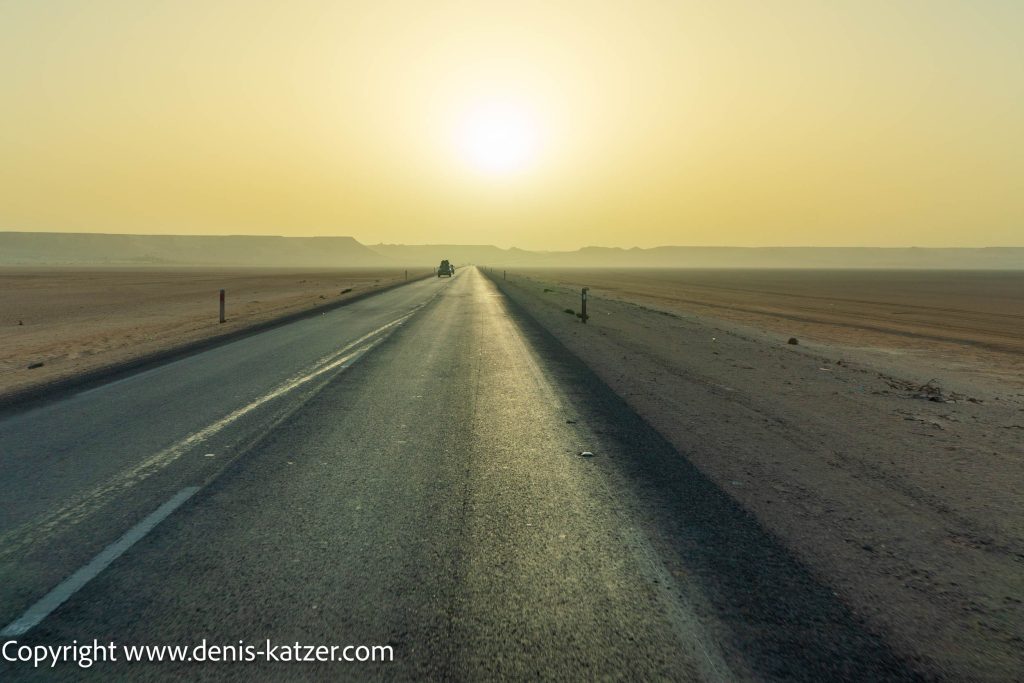
FROM MOROCCO TO MAURETANIA
N 20°51'05.0" W 017°01'51.7"
Day: 378
Camp: 71
Country: Mauritania
Location: Pitch on the shore of the Atlantic
Latitude N: 20°51’05.0″
Longitude W: 017°01’51.7″
Daily kilometers: 457 km
Total kilometers: 10,062 km
Height: 5 meters
Temperature day max: 25°
Night temperature: 19°
Departure: 08:00 am
Arrival: 22:30
Travel time: 12:30 hrs.
As we still have to cover around 380 kilometers to the Mauritanian border and our Moroccan visas expire tomorrow, we set off at dawn today. We are stopped by a police station on the ascent to the P1100. Although we have almost always got through previous police checks without any problems, today we are waved aside. It turns out that we have overlooked a stop sign. “It’s absolutely essential to stop at this point,” the police officer explains. “We are truly sorry, we know that. We probably overlooked the sign because it was so early in the morning. It won’t happen again,” we apologize. The friendly officer then lets us drive on and wishes us a good day. We were lucky, because according to the information we received, such an offense is punishable by a fine of €30.
As the diesel in Mauritania may not be of the same quality as in Morocco, we want to fill up again here. In addition, diesel is subsidized by the state in Western Sahara and is quite cheap at a price of 11.42 dirhams per liter, which corresponds to around 1.10 euros. As we are not sure whether there are any petrol stations along the route from here to the border, we decide to take a short detour via the town of Daklah to fill up our tank there.
Back on the N1, we continue our journey in a southerly direction. The surrounding desert landscape hardly changes. While Tanja sits at the wheel for hours and steers us safely through the endless sea of sand, I spend most of the time asleep. This is mainly due to the after-effects of the terrible virus that put Tanja out of action a few days ago. Fortunately, she has already recovered, while I am still struggling with the symptoms.
The past few days have made it clear to us once again how important it is that we are both able to control our Terra Love. On a trip like this, it can always happen that you catch an upset stomach or, as in our current case, fall ill or even injure yourself. In situations like this, it is crucial that we can both drive. In the worst case, this can even be life-saving.
Then we continue through the Sahara. Again there are heavy sand drifts and strong crosswinds. We pass herds of camels, huge dunes and the occasional rock formation sculpted by the wind. The storm calms down a little in the afternoon. Delicate veils of sand blow across the road. The air has become clearer and we can breathe freely again. Due to the high levels of particulate matter in the air, the inhabitants of these desert regions often suffer from breathing difficulties, coughing and in some cases even respiratory infections. Furthermore, fine sand can get into the eyes and cause irritation, redness and even injury. Not to mention massive skin problems. This is the reason why the people living here wrap their entire heads in scarves, so that only dark sunglasses can be seen between all the cloth sheets.
We slowly approach the Mauritanian border, where reports of corruption heighten our tension. Poverty and low incomes are driving civil servants to seek additional income opportunities. The lack of transparency in government and finance facilitates corruption, while personal relationships often determine performance when filling positions and awarding contracts. Mauritania has taken measures against corruption, including anti-corruption laws and improvements in transparency. International organizations such as the United Nations and the World Bank support these efforts. Let’s see what awaits us.
At around 5 p.m., after a seven-hour drive, we reach the Moroccan border and join the queue of cars waiting to enter the border area. An official points out the crossed-out lettering “Western Sahara” and explains that this belongs to Morocco. “Yes, exactly, that’s why ‘Western Sahara’ is crossed out,” I reply with a laugh. Then we are allowed to pass. A crowd of people forms in front of a small house, waiting to receive an exit stamp. A Moroccan helps me and puts our passports under the pile of documents lying there. The only official patiently processes one passport after the other. A motorcyclist from the USA, two from Spain and a traveler from Canada are also in the queue. We use the waiting time to exchange some information.
After we finally have our stamp in our passport, we are allowed to drive a little further. I have to go to an official who issues a document for our vehicle and enters all the data in a list. We then drive to the scanner. There I hand over the document and the small white paper that we received when we entered the country to an official. We get out of the vehicle, which is then scanned, and are then allowed to drive on. As we leave the large hall, we see a large sandy area on the left where many trucks are being searched by customs officers. We ignore them and follow the asphalt strip to a post. “The papers, please,” says the officer. “What papers?” I ask. He kindly explains to me in rudimentary English what the papers should look like. “The man at the scanner has them,” I remember. “You have to get them,” says the officer. I jog back to the vehicle and drive to the X-ray facility. There I ask for my papers, which a man in uniform gives me without comment. Very well, I think to myself. I walk back to the vehicle and drive back to the checkpoint. “You need a customs stamp,” the official now says. “Okay,” I reply with a patient smile, get into our Terra Love and drive back to where we’ve just come from. “I’ll try to find someone who can help us,” I say to Tanja and leave our expedition vehicle. “You’ll get the stamp from the customs officer,” a man explains to me a little later in sign language and Arabic. “Where can I find the customs officer?” I ask almost desperately. He fetches another officer who speaks a little English.
He explains the direction to me. I don’t understand anything, but I go in the direction indicated and ask around until I end up in a building. I put my papers on the table there. “Your passport, please,” the man demands sternly. “It’s in the vehicle,” I reply and hurry back to get it. Then the paper is finally stamped. I get into our camper van and drive back to the checkpoint. There the official takes the paper in a friendly manner and gives me the small entry document for our vehicle.
“Pick that up. You will need it when you re-enter the country,” he says. I say thank you and drive about 50 meters further when a policeman wants to check our passports. After the check, we drive about 10 meters when another officer checks our passports and the vehicle registration document again. “Wait here,” he says and disappears into a little house with our passports. “Everything’s fine,” he says a little later, whereupon we are allowed to leave Morocco and find ourselves in no man’s land between Morocco and Mauritania.
Morocco and Mauritania have experienced several conflicts and tensions in their shared history. A major conflict occurred in 1975 over the Western Sahara, a territory claimed by both countries. This conflict resulted in the no man’s land we are currently driving through. It is essentially a demilitarized zone that lies between the two countries and serves as a buffer zone to prevent further conflict. The no man’s land is symbolic of the complex geopolitical tensions and conflicts in the region and remains an important aspect of the efforts to find a peaceful solution to the Western Sahara conflict. After a few kilometers on an asphalt section, the road turns into a rough, potholed gravel track. It is suspected that there may be mines along the road, so it is advisable not to take breaks to walk in the desert.
When we reach the Mauritanian border, several fixers offer us their services to get through the controls more quickly for around €20. Although some travelers report that such help makes crossing the border easier, we refuse. We enter a building where an official enters our passport data into a computer. In another building our fingerprints are taken and a photo is taken of us. Here we receive our monthly visa for €55 per person. We then go to customs, where our car is thoroughly examined by a drug-sniffing dog, both inside and out. When I receive the import slip for our Terra Love, the official demands €10. Since I doubt whether this fee is legitimate, I decide not to pay. Nevertheless, I receive the important customs documents with a friendly smile. After another check, we are finally allowed to enter Mauritania.
Just over the border, we stop next to a flat building where a heavily masked young man is sitting, selling us the insurance we need for our Terra Love. “3,129 Ouguiya”, he demands in a friendly manner (abbreviated MRU or MRO, which is roughly equivalent to 1 euro, 43.18 Ouguiya). We receive 40.05 Ouguiya. This means that the insurance costs 78 euros per month.
Tanja gets a SIM card, which costs 17 euros without data and around 20 euros with 6 GB. We are not sure whether we have been ripped off. When everything is ready, it is pitch dark. Because we don’t want to spend the night here, right on the border, we want to set off and navigate to a campsite recommended to us by our friends Micha and Sabine.
We have to stop for the first time on the little-used border road to fill in a form with our vehicle and passport details. A little later we are stopped again. The policeman greets us in a friendly manner, checks the details of our expedition vehicle and waves us on.
(Fiche” is a French word that can have various meanings when translated. In relation to police checks or border crossings, “fiche” is often used to refer to a form or record on which personal information such as name, address, passport number, vehicle details, etc. is recorded).
We reach the town of Nouadhibou, formerly known as Port-Étienne. It is the second largest city, home to the largest port and serves as the economic center of Mauritania. Most of the traffic lights have failed. The traffic chaos at night demands our absolute attention. Nobody sticks to the rules. Even if one of the few functioning traffic lights is red, it is simply ignored by all road users. Almost every vehicle is defective or in a deplorable condition. It’s really chaotic. If this was our first road experience in Africa, we would be sweating with nervousness.
Visible poverty hits us like a hammer. Mauritania is one of the poorest countries in the world. There is a high level of economic inequality here, with much of the wealth and resources concentrated among a small elite. As a result, the poorest population groups have only limited access to resources and opportunities. What shocks us most, however, is that slavery continues to exist in Mauritania despite several official abolitions – most recently in 2007. This concerns the descendants of people who were enslaved generations ago and have not yet been freed. The main victims are black people who serve as slaves for the Bidhan ethnic group (also known as “white Moors”). The exact number of slaves in the country is unknown, but is estimated by human rights groups to be in the hundreds of thousands…
About an hour and a half later, we reach the coordinates given to us by Sabine and Micha and find ourselves in front of a hotel. “Where is the place Micah was talking about?” I ask. “No idea,” Tanja replies, yawning. Since we can’t find anything, we decide to stay here in the parking lot. Suddenly, a parking attendant appears out of nowhere. He only speaks French, which doesn’t make communication easy for us. “Go to reception, you can pay for the pitch there,” we think we understand. I actually pay around 500 MRU at reception, which is about €12.50 for the pitch. The parking attendant then takes us to the parking space below the hotel. The clay court is closed off with an iron gate. Another guard steps out of a tiny, dilapidated cottage. He greets us silently and unlocks the iron gate. Both men wave us through the portal. As soon as we are inside, it is closed again behind us with a coarse iron chain. In the darkness, we park our Terra Love directly on the steep bank. Roaring waves and an oncoming storm swirl tons of fine sand through the air. Our Terra Love sways and groans like an ancient woman…
Here is the link to the video:




